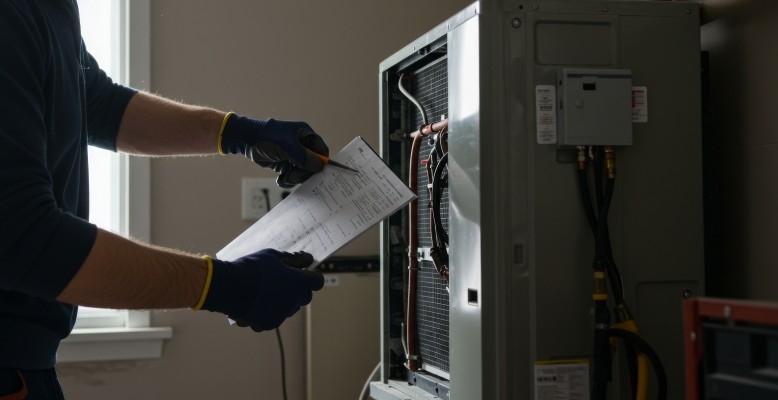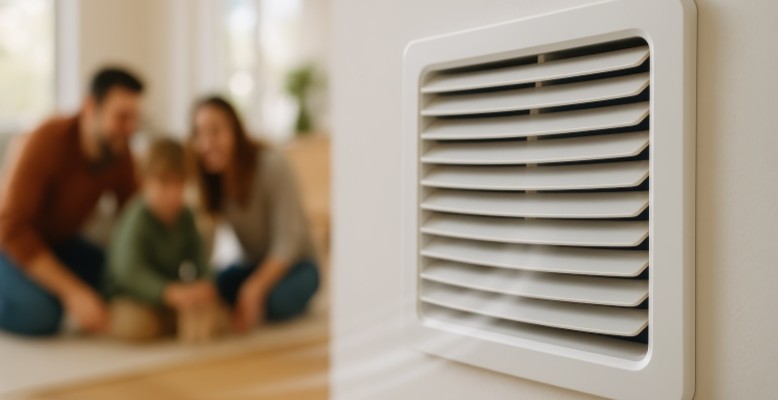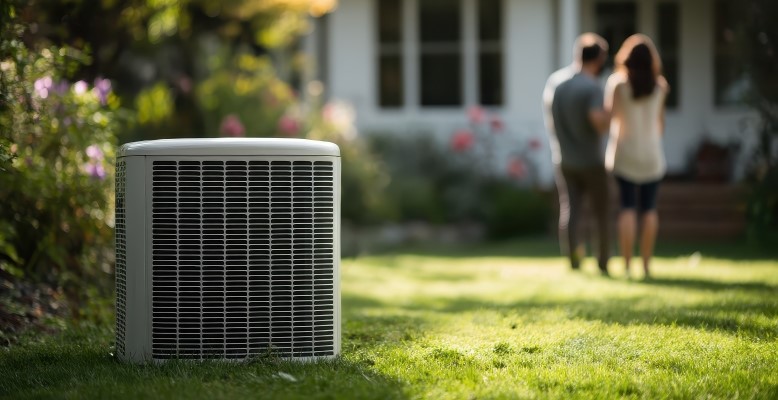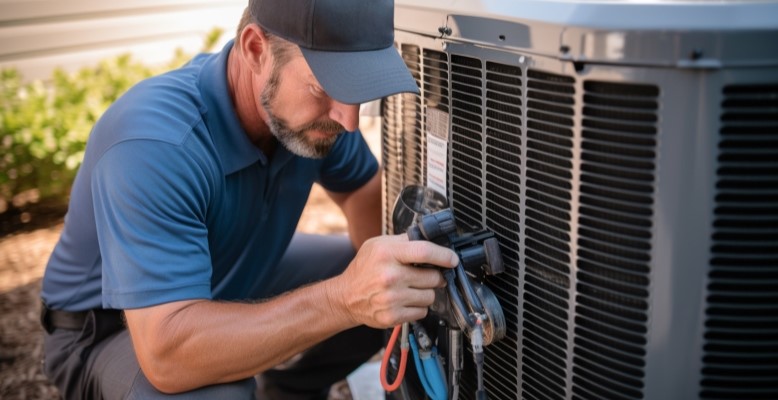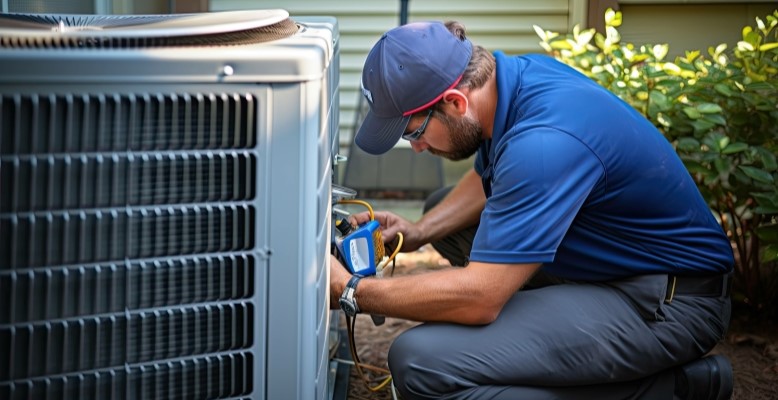Published on July 23, 2025 by: alhhvac
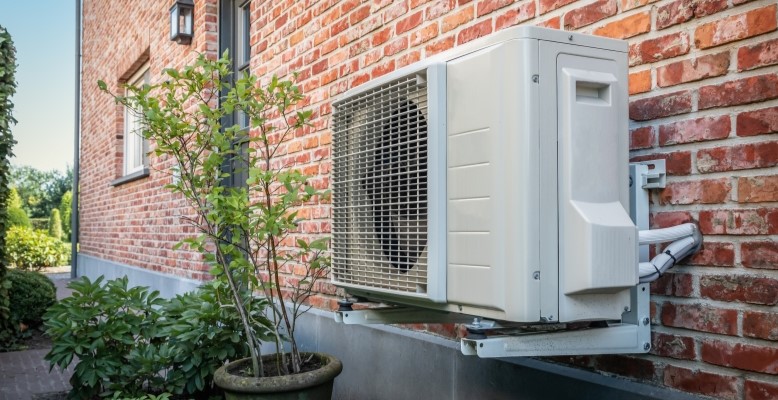
Key Ways HVAC Summer Tune Ups Can Keep Your System Cooling
As the days get longer and the temperatures climb, your home’s HVAC system becomes a necessity, not a convenience. But summer heat doesn’t just challenge your comfort; it also tests the reliability and efficiency of your cooling system. Without proper preparation, your HVAC unit can become overworked, leading to higher energy bills, inconsistent cooling, or even unexpected breakdowns during the hottest days of the year. And they’ll be hot; according to the Savannah Morning News, the Atlanta area alone can expect 45 days minimum of 90 degree or warmer weather.
The experts at Andy/ Lewis Hobson have you covered. We’ll break down common HVAC issues that tend to surface during the summer, practical maintenance tips to keep your system running efficiently, and why scheduling a tune-up before the heat peaks can help you avoid costly disruptions. With just a few preventative steps, you can ensure your home stays cool, comfortable, and energy-efficient all season long.
Common Summer HVAC Issues: Don’t Get Beat By the Heat
When summer temperatures soar, the last thing any homeowner wants is for their air conditioning to fall short. Unfortunately, the heat isn’t the only thing that can rise this time of year — energy bills and HVAC malfunctions often follow suit. From thermostats set to inefficient temperatures to undetected refrigerant leaks, a variety of issues can strain your system and your comfort.
Misconfigured Thermostats
Energy-efficient air conditioning systems help homeowners reap massive savings on their energy bills by programming units to only turn on when home temperatures rise above a certain level. These thermostats, however, are only as effective as the setting they are set to; many homeowners fail to configure their thermostats to the optimal temperature, leading to poor internal cooling and wasted energy.
Typical issues homeowners face with misconfigured thermostats include:
- Leaving thermostats at the same temperature all day, keeping systems running as residents go to work or sleep.
- Forgetting to turn off thermostats for vacation, wasting energy as no one uses a residence for days at a time.
- Setting thermostats at the wrong temperature, overworking HVAC systems when a lower temperature would still keep residents comfortable.
Refrigerant Leaks
Refrigerants are integral to HVAC system function; these compounds cycle through a system’s refrigerant lines to absorb heat from the inside of your residence and transfer it outside. While essential to keeping your home cool, refrigerant solutions also pose massive risks to residents if they leak. Refrigerant poisoning can cause issues including:
- Swelling in throats or sinuses
- Difficulty breathing
- Burning sensations in eyes, nose, ears, lips
- Blurred vision or vision loss
- Severe pain in nose, throat or sinuses
Wondering if you’re at risk in your home? Warning signs of refrigerant leaks within your HVAC system include:
- Frozen evaporator coils
- Noticeable liquid leaks
- Hissing sounds in your unite
- Bubbles in evaporator coils
- Increase home humidity
Excessive Indoor Moisture
Speaking of increased home humidity — higher levels of interior moisture can be a major HVAC issue for homeowners during hotter months. Several problems with your HVAC unit can cause high humidity inside your residence, including:
- Thermostat issues, including improper temperature settings
- Debris build up in air filters, preventing disbursement of hot air through vents
- Faulty evaporator coils, hindering proper humidity extraction and ventilation
- Outdated HVAC systems failing to function at high levels due to lack of maintenance
Indoor humidity can cause short-term issues such as mold growth and condensation, either of which can lead to long-term damage to both property and residents.
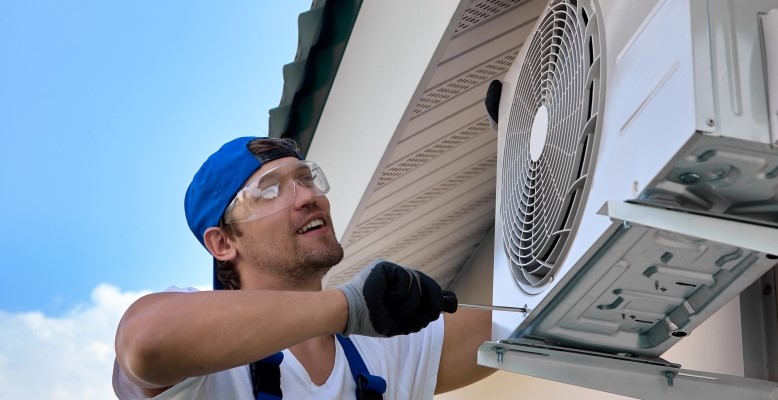
Weak System Airflow
On sweltering July and August days, residents want their HVAC system blowing at full blast; there’s nothing worse than coming inside looking to refresh, only to be greeted by poor HVAC system airflow. Fixing feeble air conditioning airflow can make or break otherwise wonderful summer experiences.
Poor HVAC airflow is often caused by clogged or blocked air filters, but can also underlie major problems with your entire system. If you’re concerned with airflow in your HVAC system, consider contacting an air conditioning repair expert to replace your filter and check your system for more serious issues.
Summer HVAC Tips That Will Keep Your Home Cool
Beating the summer heat doesn’t always mean cranking the AC to its max. With a few smart strategies, you can keep your home comfortable while saving money and reducing wear on your HVAC system. Whether it’s using a programmable thermostat to match your daily routine or keeping your air filters fresh and clean, small adjustments can have a big impact.
Using a Programmable Thermostat
Programmable thermostats are a versatile tool to maintain effective temperature in your residence without blowing up your energy bill. These thermostats can be programmed to keep homes warmer when you’re not there and cooler when you’re away, based on the unique quirks of your schedule. Doing so will reduce overall strain on your unit, while also saving you money; the U.S. Department of Energy recommends turning your thermostat back 7°-10°F from it’s normal setting for 8 hours a day, leading to energy savings of as much as 10% a year.
One other tip for programmable thermostats — avoid setting the temperature at a colder setting than normal when you do get home. HVAC units don’t cool your home any faster when you set them to a colder temperature; instead, you only risk over-working your system or making your home uncomfortable.
Changing Air Filters
While your need for monthly HVAC maintenance will change based on the unique characteristics of your unit, changing air filters is a great way to make sure your system’s airflow is powerful enough to cool your entire home. Factors that affect how often you should change your HVAC filter include:
- Type of filter, from standard fiberglass through high-efficiency HEPA filters
- Filter thickness, with skinnier filters requiring more frequent changing
- HVAC usage, with systems under higher duress requiring greater care
- Pets, as pet hair and dander can rapidly clog HVAC filters
- General dust and air quality levels, with higher levels of indoor activity leading to greater strain
Faulty air filters are often visibly clogged with dust or debris; however, contacting an HVAC maintenance expert can ensure you effectively change your filters when necessary.
Schedule a Summer HVAC Tune-Up
Getting an HVAC tune-up before summer hits full swing is one of the best ways to prepare your home for rising temperatures. Routine maintenance can offer diverse benefits for home-owners, including:
- Improve system efficiency
- Lowered energy usage
- Reduced risk of mid-season breakdown
A thorough tune-up typically includes:
- Checking refrigerant levels
- Inspecting and cleaning coils
- Tightening electrical connections
- Ensuring your thermostat is functioning properly
By addressing these components early, you’ll help your system run more reliably and avoid unexpected disruptions during peak cooling season.

Andy Lewis / Hobson Keeps Your HVAC Running Throughout the Summer
Keeping your home cool and comfortable during the summer doesn’t have to be a challenge—especially when you have the right HVAC partner. At Andy Lewis / Hobson, we offer comprehensive HVAC services designed to help you avoid common seasonal issues like weak airflow, refrigerant leaks, and inefficient thermostat settings. Our team provides expert maintenance and diagnostics to ensure your system runs smoothly and efficiently when it matters most.
Whether you need a routine tune-up, help programming your thermostat, or a professional assessment of your system’s performance, ALH is here to help. Our certified technicians are equipped to spot and resolve problems before they escalate—saving you from unexpected breakdowns and costly repairs in the middle of summer. Contact us today.


